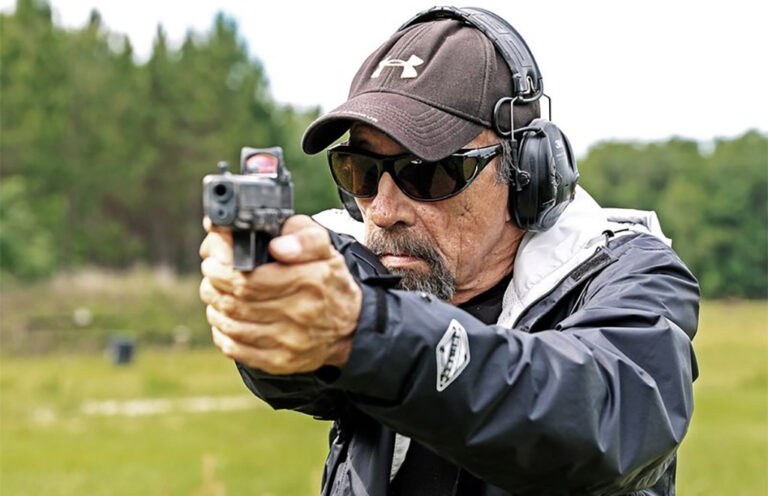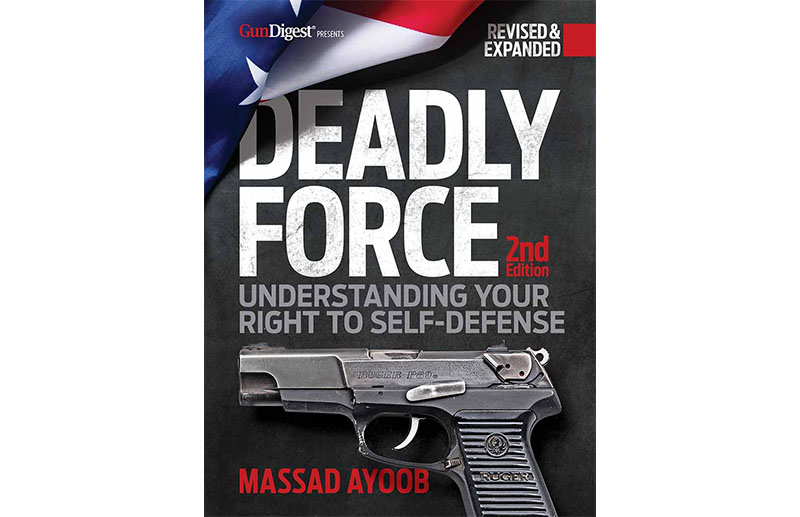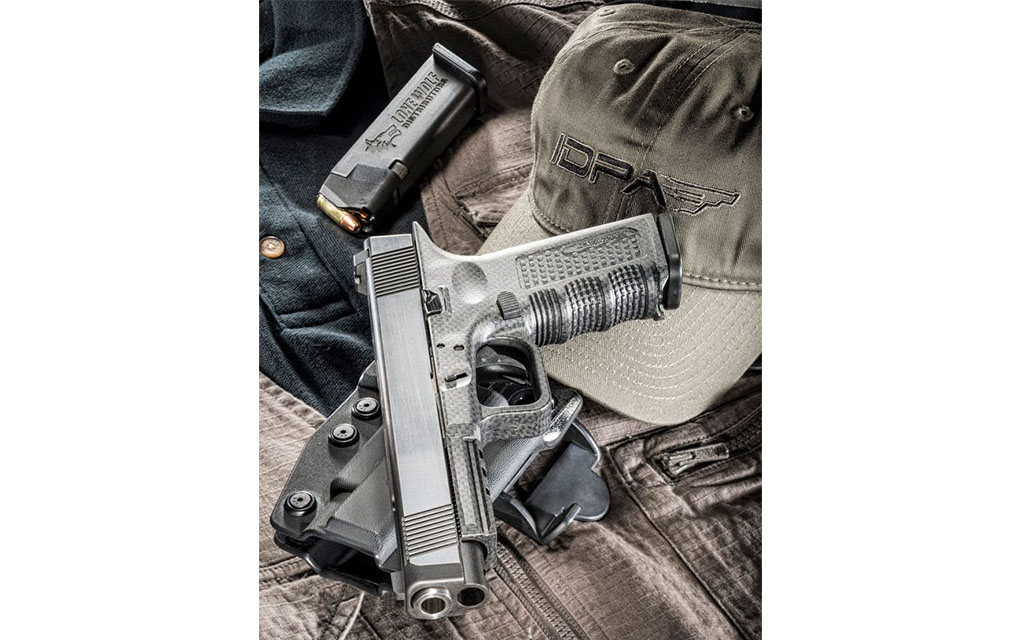
In this excerpt from Deadly Force, 2nd Edition, Massad Ayoob discusses the finer points of attorney selection following a self-defense incident.
Even the most righteous defensive use of a firearm can lead to a false allegation of wrongdoing. It might be an unmeritorious civil lawsuit motivated by greed or revenge or a criminal charge promulgated by a self-styled social justice warrior in a prosecutor’s office.

The poet Robert Frost once defined a jury as “12 people assembled to determine who has the best attorney.” There is much truth in this, and people who read this book—people who have accepted the responsibility to protect innocent people—need to take that to heart. Such people are alpha males and females accustomed to being in charge of important matters.
They have to understand that they are not the players when they are on trial anymore.
They are the stakes.
Their attorney is the player. Accordingly, they want the game’s best player to represent them at the table.
The ‘Game’
I don’t consider a trial to be a game. Neither should you. But many attorneys do, and it’s essential to understand that.
Many people think the best attorney for a shooting case is the most famous criminal lawyer in the region. That’s not necessarily true. That “Perry Mason of the community” often got his reputation by pulling rabbits out of hats and winning acquittals for obviously guilty criminals. That sort of legal wizardry employs tactics that are almost 180 degrees opposite of the best skillset for defending legitimate, lawful uses of lethal force.
Never forget that the defense of a genuinely justified use of lethal force is an affirmative defense! We are not claiming that we didn’t shoot our attacker; instead, we are stipulating that we did indeed shoot him, but we are maintaining that we were correct.
My work over the years has brought me into contact with many criminal defense lawyers. I can usually find time to ask them a few questions unrelated to the particular case at bar. One of those questions is, “Counselor, in all your years in defense bar, how many of your clients were innocent, wrongly accused men or women?”
The answer has always been a relatively tiny percentage who weren’t either guilty as charged or at least guilty of some lesser included offense. One with more than 30 years of practice answered, “Oh, it happens. A good 1 out of a 100 really is totally innocent.” Some others have told me they don’t think they’ve ever defended an innocent person.
If that is your professional experience, you will develop a formula of guilt mitigation and establishing some element of reasonable doubt because that’s all you, as a defense attorney with a guilty client, have to work with. It becomes your standard, automatic default. Let’s examine why that doesn’t work for the truly innocent defendant.
A guilty man’s lawyer never wants to put him on the witness stand: what can he possibly say that won’t be either an admission of guilt or a lie? The lie will open the client to the additional charge of felony perjury. If it appears that his attorney coached him to lie on the witness stand, the lawyer himself has to worry about the criminal charge of subornation of perjury and can hear his license to practice law grow wings and prepare to fly away. So, of course, his default practice becomes, “I never put my clients on the witness stand!”
In contrast, the defendant must take the stand in an affirmative defense. It’s not a “whodunnit” anymore: We’ve already established that it was the defendant who killed the deceased. It’s now a “why did he or she do it,” and who besides the defendant can truly answer that question?
The criminal defense lawyer whose experience is primarily defending the guilty routinely advises, “Never talk to the police!” The reason for that should be obvious: what can the guilty man say that won’t inculpate him and make his conviction all the more certain? He can lie, but he’ll almost certainly be caught in that lie, and lying to the police is another crime in and of itself. “Never talk to the police” probably is the best advice the lawyer can give to a potential future guilty client.
But the innocent person who fired in self-defense is poorly served by this advice.
A guilty man’s lawyer who gives an innocent client a guilty man’s defense will likely end up with a guilty man’s verdict.
If the client has established something like “This man attacked me” and pointed out evidence and witnesses from his first contact, he has made it much easier for his attorney to give him a solid affirmative defense. It is defense lawyers who have spent ninety-plus percent of their careers defending at least partially guilty clients who advise “Never talk to the police.” A defendant with the mental discipline to go through the “Five Point Checklist” I’ve described elsewhere in this book will have better paved the way for their attorney to drive them safely through trial to an acquittal.

Desirable Defense Attorney Attributes
All other things being equal, I would much prefer to have a law firm or at least a partnership defending me rather than a sole practitioner. Now, there are some exceptions to this. In the 1980s, I watched Gene Compton, a sole practitioner in Virginia, carry his wrongly accused client Mark Branham on a long, exhausting journey that lasted through three trials before winning the ultimate acquittal.
During that ordeal, focused exclusively on the Branham trial for weeks, Gene paid out of his pocket to keep the office open, knowing that the client couldn’t afford his usual fees. This was dedication “above and beyond the call of duty.” The attorney, after all, has a duty to their staff to generate enough income to write their paychecks and “keep the lights on.” Lawyers with that degree of dedication are not found in every office. A firm with multiple lawyers bringing in multiple fees can handle such things more easily.
During trial, good lawyers don’t get much sleep. The other side may be trying to surprise them at every turn, requiring them to burn the midnight oil between trial days. The emotional exhaustion of trial is exacerbated for any ethical attorney who knows they are defending an innocent person, which translates to physical exhaustion and running out of time when you have to do everything yourself without other lawyers taking the slack. Here’s an example from the 2021 trial of police officer Derek Chauvin in the death of George Floyd, which was the highest-profile case of its period and triggered riots nationwide.
On April 20, 2021, in my blog, in an entry titled “Thoughts On the Chauvin Verdict,” I wrote: “I don’t think the harsh criticism I’m seeing of defense attorney Eric Nelson is warranted. He was David against Goliath, the sole attorney of record that the police union could afford, against no less than three attorneys at the prosecutors’ table at any time and more behind the scenes backing them up. At the same time, Nelson’s only assistance in court came from a fledgling lawyer who had just passed her bar exam and was acting as an intern. I thought he did an excellent job cross-examining the State’s witnesses, and his necessarily long close was more professional than his prosecutorial counterpart’s.”
Chauvin was, of course, convicted. Many followed that case closely and think there was ample reasonable doubt as to whether Chauvin’s kneeling on Floyd for more than nine minutes caused his death—there was evidence that the deceased had enough fentanyl in his system to kill him and maybe enough to kill a couple of people—but I also had a sense of a defense team that was overwhelmed by a much larger prosecution team that also had media-driven public sentiment on its side.
An excellent lawyer, whom I won’t name here because it wasn’t his fault, lost a murder case in California. A sole practitioner, he learned before trial that his brother had been in a car crash and was not expected to survive. By trial time, he had been without sleep for days, living on black coffee and unfiltered Camel cigarettes. During the trial, I found him groggy, distracted, and “out of it.” In mid-trial, he collapsed and was rushed to the hospital by ambulance. There was no one to “pick up the ball” and run with it. His client was convicted and remains in prison.
In a murder trial in Florida, I saw something similar: The trial lawyer was a sole practitioner and a brittle diabetic whose illness was greatly aggravated by the long hours, insomnia and stress of the trial. He had no one to back him up when his disease hit him hard during trial, impairing his focus. The jury found the client guilty of the lesser included charge of manslaughter.
Many military combat survivors will tell you, “No one person can do it alone.” That is true to a significant degree in the combat of the courts. That’s why I worry about hiring a solo practitioner for the defense.
Don’t despair if financial considerations limit you to a public defender. Public defenders get a bad rap because they are notoriously underfunded and overburdened, but don’t fall for the stereotype that they’ll always give you a sub-par defense. The constant heat of their heavy caseloads has forged some excellent trial lawyers who began as public defenders; the great Roy Black in Miami comes to mind. Elsewhere in this book, Gila Hayes’ case study of the Larry Hickey trials demonstrates the splendid work public defenders such as Matt Messmer can do. A good public defender lives for the chance to exonerate a truly innocent client.
As noted earlier, you’re looking for the best attorney for an affirmative defense, not necessarily criminal defense in general. I, for one, wouldn’t want a flamboyant superstar known for courtroom shenanigans; they’ll often turn the judge against them, which never helps the client. The sort of lawyer who seems to have majored in Drama and minored in Law tends to aggravate a jury, and the jury tends to see lawyer and client as one, joined at the hip. If the attorney insults or angers them, the only way they can retaliate is to convict his client … you. I want my attorney to be calm, likable and dignified. I want a defense lawyer respected by the prosecutors and the judge alike: the sort of white-maned old lion (or lioness) of the courts that the Bar Association picks to give Ethics lectures at CLE (Continuing Legal Education) training seminars for other lawyers.
The lawyer must know the ins and outs of forensic evidence and proper investigation protocols in shooting cases. How do you find such an attorney near you?
One answer is: use the one the cops use.
It won’t be hard to find out what union or fraternal organization (such as FOP, the Fraternal Order of Police, or PBA, Patrolman’s Benevolent Association) represents your local police officers or county sheriff’s deputies. Reach out to that organization and ask them what criminal defense lawyer they retain for one of their members who is wrongfully indicted after a line of duty or off-duty shooting. That will be an attorney who knows the subtleties of handling a defensive shooting case. If that particular attorney only speaks for police, they will almost certainly be able to refer you to a lawyer who knows what they know and accepts private citizen clients.
Or you can reach out to your post-self-defense support group … if you belong to one!
Post-Self-Defense Support Groups
Over my decades as an expert witness, one thing that has always appalled me has been the enormous cost of legal defense, both criminal and civil, against unmeritorious allegations growing out of genuine self-defense cases. I’ve seen people go bankrupt. I’ve seen retirees have to go back to work full time. I’ve seen people who thought they would die peacefully in a home they owned free and clear to bequeath to their decedents, having to mortgage or reverse mortgage those homes to pay the legal fees. In my most recent murder trial of an armed citizen I helped get fully acquitted, I joined him for a celebratory beer the day after the verdict. He told me that his legal expenses had totaled $300,000 or a little more—and there was still a lawsuit in the wings, filed by the deceased’s family.
My colleague Marty Hayes has seen the same thing and did something about it. A highly successful expert witness in the same field as me since 1990 and a former LEO at ranks up to CLEO (Chief Law Enforcement Officer), Marty has also been one of the nation’s top firearms and lethal force instructors for decades. He graduated from law school in 2007 and founded the first support group for this sort of situation, the Armed Citizens Legal Defense Network (ACLDN, ArmedCitizensNetwork.org), the following year.
Hayes explains, “The idea of the Network came from discussing the aftermath of lawful self-defense with my students at the Firearms Academy of Seattle. Most students were very concerned about what to do after a shooting but did not have sufficient money to mount a legal defense. That was the beginning of the Network, and as I was at the time going through law school, I hit upon the idea that instead of becoming a practicing attorney, I would see if my students would pay a little money each year to have the possibility of assistance after an incident. They did, and the effort soon spread nationwide.”
The concept quickly caught on and was followed by many imitators, most with different business models. ACLDN is not insurance but instead is member-supported. Members receive several training videos featuring leading experts and attorneys in the field. ACLDN’s structure includes an advisory board consisting of Hayes and administrator Vincent Schuck, ace instructors Tom Givens and John Farnam, the same Dennis Tueller mentioned in this book, attorney and firearms expert Emmanuel Kapelsohn, pro-police and pro-gun attorney Marie D’Amico, and master instructor Karl Rehn, and this writer. The board members are available to assist members and their lawyers with trial strategy advice, expert witness appearances and additional support. ACLDN pays lawyers’ fees and related costs in criminal defense and civil lawsuits and pays bail if the member has been arrested. Coverage extends to all use of force incidents involving the defense of self or other innocent parties and is not limited to shooting incidents.
As a public service, ACLDN makes its monthly journal available even to non-members at the website listed above. A quick perusal of a few issues will give you an idea of where the organization, and its member lawyers, are coming from. Over the many years, ACLDN has resolved dozens of cases. None have had to go to trial. All have resulted in the most satisfactory outcomes possible. The organization will pay the attorney of the member’s choice or select and send in a suitable lawyer if the member doesn’t have a particular advocate in mind.

Issues In Selection of Post-Self-Defense Support Groups
While some of these groups offer insurance, many others are pre-paid legal services. The ACLDN is not insurance in any way, shape, or form, but rather a member support group providing a service analogous to a police union or fraternal organization promising to pay for legal defense for a wrongly-accused officer who belongs. Nevertheless, before signing up with any of them, I urge you to do what you would do with real insurance before signing up for a policy: READ THE FINE PRINT FIRST!
Consider the short-lived, ill-fated Carry Guard program once offered by the National Rifle Association. In this writer’s opinion, there were many things wrong with it, the cardinal one being their promise to pay every penny of your legal expenses … after you were acquitted.
Now, let that sink in. No attorney will take a criminal defense case on the promise that they will be paid only if—and after—they have won an acquittal. They require a substantial payment up front to draw from regarding legal fees and expenses as they go along. The expenses alone can be high. Volumes of paperwork (reports, depositions, statements, etc.) must be ordered beforehand, and I’ve seen the providers charge three dollars per page for these mountains of (sometimes triple-spaced) documents. Expert witnesses don’t work on later promises of payment either, nor do the court reporters transcribe depositions, etc. The attorney’s office staff have to be paid.
Reimbursement requirement is a big red flag. NRA Carry Guard is long gone, but there are organizations today that promise to pay all your legal fees and costs but require you to reimburse them if you lose the case in court. The most innocent man or woman’s case can be lost if they have an incompetent lawyer or for several other reasons.
Your support organization is supposed to be your staunch ally in your fight to keep your life as you know it. When it’s in the ally’s financial interest for you to lose the case, is that entity really your ally?
What I would call a no-violation clause could be another deal-breaker for me. This element of the agreement states that if you violate law, rules, or regulation in any way, even though the shooting itself was justifiable, the company does not have to pay for your defense. Let’s say you did not realize you were in a hotel that happens to be a “gun-free” zone, and you were carrying your gun in good faith when you had to shoot a rapist in the stairwell, an armed robber breaking into your room or a carjacker in the parking lot.
I have been in numerous establishments posted as “gun-free zones” but posted so poorly that the sign could not be seen until you left the premises, perhaps not even then. I’ve been in hotels where there weren’t any “no guns” signs in the lobbies or doors, but such a policy was stated on the hotel’s home page. We travelers rarely look at the fine print on hotel websites. But a “self-defense insurance company” will certainly look there after one of their clients has been involved in a justified shooting on such premises.
Is “no alcohol on board” a condition of coverage? If you had a pre-dinner cocktail before a two-hour dinner with friends, I would expect that small amount of alcohol to have metabolized entirely and be a non-issue when you paid for your meal, left the establishment, and had to defend yourself against an armed attacker in the parking lot. However, investigators knowing you left a place of business where alcohol is served, will doubtless check your bill, notice that you had a drink and include that in the report. Under these circumstances, a “no alcohol” policy might give the company a legal excuse to dump you and deny coverage.
Will the plan allow you to pick your own lawyer? This element is huge. If the support group insists on sending in an attorney of their choice, that might be the lowest-priced novice hungry for his first case. My Cousin Vinnie is a most enjoyable movie—I’ve met law professors who show it at law school—but the title character is the antithesis of what you want working for you when an affirmative defense is needed.
Do your due diligence and find a plan that works for you. Starry-eyed idealists still think, “A good shoot is a good shoot! None of those horror stories will ever happen to me!” That’s a mindset similar to, “I’ll never need a gun for self-defense; none of those horror stories will ever happen to me.”
But there’s another good reason to have post-self-defense support, which many people miss: deterrent effect against political prosecution or unmeritorious lawsuits. Whether in the criminal court arena or the civil, no attorney wants to bring a case he can’t win or browbeat the accused into accepting a plea bargain (criminal) or out-of-court settlement (civil). Part of their leverage in achieving that sort of thing, which I consider to be nothing less than legalized extortion when the defendant acted in legitimate self-defense, is the threat to bankrupt them with legal fees if they don’t plead or settle. When your attorney can smile at opposing counsel and say, “A third party is paying my client’s fees and expenses. Take us to court. We’ll beat you there,” the deterrent effect is obvious.
I strongly recommend that the armed citizen belongs to a post-self-defense support group for the same reason I recommend every law enforcement officer join their union, fraternal organization or bargaining entity. When wrongly accused in either criminal or civil court, it’s good to have a savvy, well-funded organization in your corner, paying for your defense.
Editor's Note: This article is an excerpt of Gun Digest's Deadly Force, 2nd Edition.
More Knowledge For The Armed Citizen:
- Carry Law: What Is A Righteous Shooting?
- Concealed Carry and the Right to Remain Silent
- Tips For Communicating With Police After Shootings
- Concealed Carry: After the Shooting
- Q&A: Massad Ayoob On Self-Defense

Next Step: Get your FREE Printable Target Pack
Enhance your shooting precision with our 62 MOA Targets, perfect for rifles and handguns. Crafted in collaboration with Storm Tactical for accuracy and versatility.
Subscribe to the Gun Digest email newsletter and get your downloadable target pack sent straight to your inbox. Stay updated with the latest firearms info in the industry.

![Best Concealed Carry Guns In 2025 [Field Tested] Wilson Combat EDC X9S 1](https://gundigest.com/wp-content/uploads/Wilson-Combat-EDC-X9S-1-324x160.jpg)


![Best 9mm Carbine: Affordable PCCs [Tested] Ruger Carbine Shooting](https://gundigest.com/wp-content/uploads/Ruger-Carbine-Shooting-100x70.jpg)
![Best AR-15: Top Options Available Today [Field Tested] Harrington and Richardson PSA XM177E2 feature](https://gundigest.com/wp-content/uploads/Harrington-and-Richardson-PSA-XM177E2-feature-100x70.jpg)
